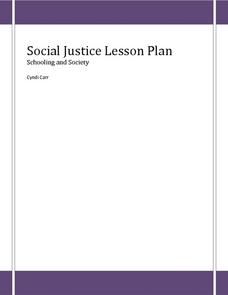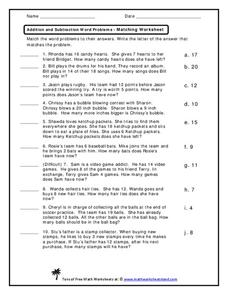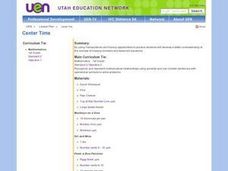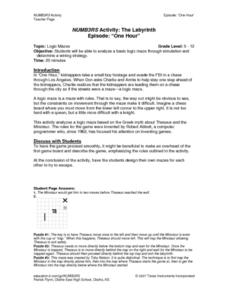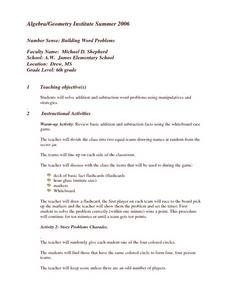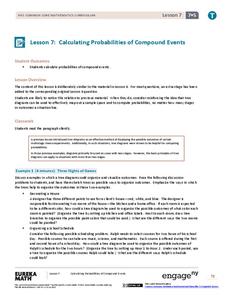Curated OER
Coin Motion
Students recognize coins and their values and count coin groups. They play a game where when music is turned on they skip, hop, jog and when it is turned off, they go to a spot in the room marked with the same coin or value as is in...
Curated OER
Social Justice-Water in Developing Countries
Learners explore how water shortage affects everyday life. In this social justice instructional activity, students discuss information about water shortage in Ghana. A water shortage simulation/game is played in which a "Canadian" team...
Curated OER
Angles, Triangles, Quadrilaterals, Circles and Related
Students classify angles. In this angles lesson plan, students explore the characteristics of angles, triangles, quadrilaterals and circles. They identify polygons and sing a classifying angles song. Students participate in a...
Curated OER
Lucky 7s
This helpful lesson explores the probability in tossing a coin and throwing dice. Specifically, it looks at the probability of getting numbers that are significant to the game of craps, assuming that once the math is understood, most...
Curated OER
Fun, Fun, Fun
Students participate in playing online games. In this practice instructional activity, students play online games to practice skills learned throughout the week.
Curated OER
Addition and Subtraction Word Problems
Approach word problems using these straightforward addition and subtraction practice scenarios. Learners choose answers from a list, recording the corresponding letter next to each problem. Ten questions involve basic addition and...
Curated OER
Less is More: Subtraction in Action
Students participate in group games to help review the concept of subtraction. During the games, they practice subtracting two-digit numbers and the concept of borrowing. They review their answers with the class and move on to...
Curated OER
Fraction Reaction
Students review how to solve problems with fractions. In groups, they participate in a card game in which they identify the fraction and its equivalent. They also complete a worksheet related to fractions and have a partner check their...
Curated OER
Probability & Game Theory
Learners explore the concept of probability. In this probability lesson, students perform various probability experiments including flipping a coin, picking m&m's out of a bag, and the birthday problem.
Curated OER
M&M Caper
Students participate in a game with M&M's to be introduced to percents and ratios. Individually, they estimate and record the number of candies they believe the bag holds and the amount of each colored candy. They open the bag and...
Curated OER
50 State Quarter Game
Students, using their knowledge of place value and number sense, play this counting game in small groups, or as a whole class, to see who be the first person to reach 50 cents.
Curated OER
Center Time
First graders recognize and represent mathematical relationships using symbols and use number sentences with operational symbols to solve problems. They complete various activities such as tug of war, monkeys on a vine, and hit and miss....
Curated OER
Wheel of Fortune
This PowerPoint includes an 8 section spinner used to play Wheel of Fortune with student-generated review questions written on index cards. This game could be used for a variety of content area subjects such as spelling, vocabulary,...
Curated OER
Math Sequencing Activities
Recognizing patterns and sequences in groups of numbers is an essential skill for all students to learn.
Curated OER
Probability: The Study of Chance
Students practice the basic principles of probability by conducting an experiment, determining if a game is fair, collecting data, interpreting data, displaying data, conducting analysis, and stating and applying the rule for probability.
Curated OER
Operations with Decimal Numbers
Sixth graders demonstrate operations with decimal numbers. In this computation lesson, 6th graders play the game "Diabolical Decimals." The objects of this game is to construct the largest number after rolling a die five times. The...
Curated OER
Knock Knock Multiplication
Fifth graders listen to a story about multiplication and play a multiplication game with counters. In this multiplication lesson plan, 5th graders review all four operations and practice multiplication problems.
Curated OER
The Labyrinth
High schoolers analyze a basic logic maze based on the Greek myth about Theseus and the Minotaur. Through simulation they determine a winning strategy. At the conclusion of the activity, they design their own mazes for each other to...
Curated OER
Building Word Problems
Sixth graders study addition and subtraction facts. In equal groups, they play a race game to correctly solve addition and subtraction problems. Using a PowerPoint presentation, the teacher demonstrates how to write word problems and...
Curated OER
Triangle Wars
Young scholars explore geometry by participating in a class card game. In this triangle instructional activity, students utilize playing cards with shapes on them which they group up and discard, similar to "Old Maid." Young scholars...
Curated OER
Solving a Simple Maze
It is a-maze-ing how lost one can get. Teams reconstruct a simple maze and solve it. Participants create an algorithm that a robot would follow in order to solve the maze as well. The activity includes an extension directing pupils to...
Curated OER
Graph Functions with Integers
Fifth graders can do a quick review of graphing functions using integers with this worksheet. The worksheet has questions which require students to identify the pertinent information in a word problem, and create a graph to represent the...
Curated OER
Understanding Place Value
Fifth graders study place value. After forming teams, they play a game called, "Who Can Line Up the Number." Students observe numbers in expanded form and place representative digits in the correct order.
EngageNY
Calculating Probabilities of Compound Events
Use tree diagrams with multiple branches to calculate the probabilities of compound events. Pupils use tree diagrams to find the sample space for probability problems and use them to determine the probability of compound events in the...

